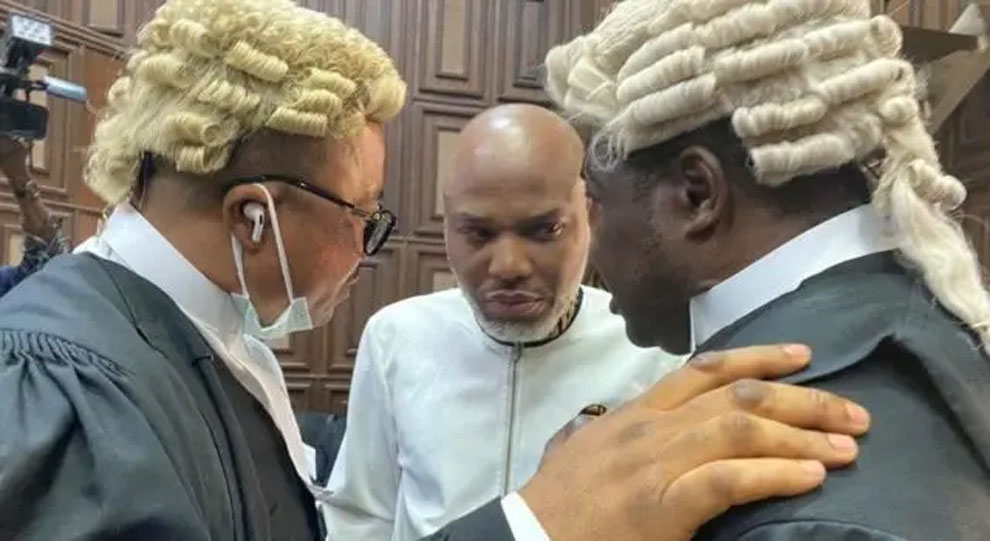News
Appeal Court rejects Kanu’s move to challenge IPOB’s proscription

Appeal Court rejects Kanu’s move to challenge IPOB’s proscription
The Court of Appeal in Abuja has rejected an application by detained leader of the proscribed separatist group, the Indigenous People of Biafra (IPOB), Nnamdi Kanu seeking to be allowed to challenge the order proscribing the group.
In a judgment, the Court of Appeal upheld the argument by lawyer to the federal government, Oyin Koleosho, that the application filed for Kanu by his lawyer, Alloy Ejimakor, was inappropriate.
Kanu had, in the application, sought to be allowed to appeal, as an interested party, the January 18, 2018 ruling by Justice Abdu Kafarati of the Federal High Court, Abuja (now late) affirming his earlier ex-parte order of September 20, 2017 proscribing IPOB and designating it a terrorist group.
It was part of Kanu’s contention that, since the Fed Govt allegedly capitalised on the IPOB proscription order to charge him with belonging to, and leading a terrorist group, he was qualified as an interested party, who should be allowed to part of a pending appeal filed by IPOB against the order proscribing it.
In the judgment delivered on May 30, a certified true copy (CTC) of which The Nation saw on June 12, a three member panel of the Court of Appeal held that it was inappropriate for Kanu to have filed his application directly at the appellate court.
Justice Hamma Barka, in the lead judgment, held that, as an applicant seeking leave to appeal as an interested party, Kanu ought to first file his application before the Federal High Court, Abuja, whose decision he sought to appeal.
READ ALSO:
- No agreement reached with FG on new minimum wage, labour counters Tinubu
- 27 Pro-Wike lawmakers lose as CTC reveals court decision
- Five-storey building under construction collapses in Anambra school
Justice Barka further held that Kanu’s failure to first file his application before the Federal High Court was a violation of Order 6 Rule 4 of the Court of Appeal Rules 2021.
He said: “In the instant case, it is apparent that no such leave was sought from the court below, thus, an affront to the provisions of Order 6 Rule 4 of the Court of Appeal Rules, 2021.
“This knocks off the present application as being incompetent, not capable of being granted.
“The consideration of all other issues canvased to my mind will amount to an academic exercise for which courts are enjoined not to embark upon, and for this singular reason, the application being incompetent is accordingly struck out.”
Upon an ex-parte motion by the Attorney General of the Federation (AGF), marked: FHC/AB)/CS/871/2017, Justice Kafarati had, in a ruling on September 20, 2017 ordered as follows:
*That an order declaring that the activities of the respondent (Indigenous People of Biafra) in any part of Nigeria, especially in the South east and South-South regions of Nigeria, either in groups or as individuals, amounts to acts of terrorism and illegality is granted.
*That an order proscribing the existence of the respondent (Indigenous People of Biafra) in any part of Nigeria, especially in the South east and South-South regions of Nigeria, either in groups or as individuals by whatever name they are called and publishing same in the official gazette and two national dailies, is granted.
*That an order restraining any person or group of persons from participating in any manner whatsoever in any form of activities involving or concerning the prosecution of the collective intention or otherwise of the respondent (Indigenous People of Biafra) under any other name or platform however called or described, is granted.
IPOB later applied to the court for it to set aside the orders, and in a ruling on January 18, 2018, Justice Kafarati dismissed IPOB’s application and affirmed his earlier orders proscribing the group and designating it a terrorist organisation.
IPOB subsequently lodged an appeal at the Court of Appeal, Abuja against the January 18, 2018 ruling.
It is the appeal, marked: CA/A/214/2018 that Kanu applied to be given permission to join as an interested party.
Appeal Court rejects Kanu’s move to challenge IPOB’s proscription
News
‘It’s cheating’ – Federal workers express outrage over N40,000 added to salaries

‘It’s cheating’ – Federal workers express outrage over N40,000 added to salaries
The Federal Workers Forum (FWF) has voiced strong opposition to the newly established minimum wage of N70,000, which includes a mere N40,000 increase for federal employees across Nigeria.
In a communique released following a virtual meeting of its members, the Forum lamented the severe hardships facing Nigerians due to what they described as the anti-people policies of President Bola Ahmed Tinubu’s administration.
The communique, signed by FWF National Coordinator Comrade Andrew Emelieze, urged the President to cease the suffering imposed on citizens who, he claimed, are starving, grappling with hunger, and contemplating suicide.
Copies of the communique were forwarded to several high-ranking officials, including the Senate President, Chief Justice of the Federation, Speaker of the National Assembly, Vice President, Secretary to the Government of the Federation, Minister of Labour, Minister of Justice, Head of Service of the Federation, Accountant General of the Federation, Governor of the Central Bank of Nigeria, the Salaries and Wages Commission, the International Labour Organisation (ILO), organized labour groups, the Joint National Public Service Negotiating Council (JNPSNC), and all federal workers.
Emelieze, a former chairman of the Oyo State chapter of the Trade Union Congress of Nigeria (TUC), contended that the new minimum wage of N70,000 was an unfair deal for Nigerian workers amid rising living costs.
He said: “Mr President Sir, the situation at hand is really very bad, worrisome and disturbing . Nigerians are dying of hunger.
“The tough and hard policies you are making has brought untold hardship to the Nigerian people. Our people are now stranded everywhere, almost everybody is now a beggar.
“The Nigerian daily existence is now a struggle for survival. It is as if our people have been ambushed since the removal of subsidy on petrol. It has been tales of lamentations everywhere and things have really fallen apart.
“It is so bad that many more citizens are contemplating suicide , just as suicide rate is more than ever before.
“This your hard and tough decisions have proven to be very harsh, hostile and rash. Sir your policies/reforms is sentencing Nigerians to death, your policies are tantamount to capital punishment.
“The new national minimum wage paid last September shows that only ₦40,000 is added to the salaries of all federal workers across all levels.
READ ALSO:
- Three Lagos men arrested with human parts bought from Oyingbo market
- FG bans cooking gas export from November 1
- Bill for Ibadan State creation passes second reading by Reps
“To us as federal workers, we see the consequential adjustments to the new national minimum wage as inconsequential. What has been down is the extending of the earlier wage award of ₦35,000 upgraded to ₦40,000.
“To us as workers, we feel cheated, this is exploitation of the vulnerable, the federal government is not being fair to the workers.
“How can the price of petrol be increased by over 600% and just ₦40.000 is added to the salaries of workers. We the workers feel that we have been defrauded.
“We are just wondering the essence of the tripartite committee set up for months to review the new national minimum wage. Moreso that ₦70,000 is not a living wage and some states of the federation have promised to pay more than that.
“Mr President Sir, we want to believe you are not aware that all the calculations for wage adjustment amounts to ₦40,000 to all workers including that of our Directors.
“This to us is unlike the civil service calculus and bureaucracy. We the federal workers are badly demoralised and are not happy as our living conditions continues to deteriorate, as we are daily faced with increasing cost of living crisis.
“Mr President Sir, we are calling for your immediate attention, federal government workers are starving, almost everyone is on loan to survive the day,our take home hardly survives us for a week.
“We therefore urge you to personally intervene in the plight of the federal workers.
“We urge you to reevaluate the so called new national minimum wage of ₦70,000 , this to us is ridiculous and should be a national embarrassment and a disgrace. Federal government workers have been financially embarrassed.
“We therefore reject ₦40,000 added to our monthly take home as the new national minimum wage. We urge the federal government to urgently fashion out radical moves to immediately tackle the rising cost of food stuff and other goods and services.”
Noting in particular, the continuous increment on the pump price of Premium Motor Spirit (PMS) also known as fuel since the hasty removal of fuel subsidy without concrete and alternative arrangements, the Federal workers called for
READ ALSO:
- Tinubu: Nigerians can decide to buy petrol @ N1,000/litre or CNG for N200/cubic metre
- Denying Igbo presidency for attempting to secede from Nigeria unfair – Obasanjo
- NNPC to establish 40 new CNG stations nationwide
“Our society is now stagnant , our naira is badly devalued and prices of goods and services have gone out of the reach of the masses.
“The price of petrol has been increased more than fourteen times since you came to power. Our people are paying a very heavy price for your policies .
“On our part as federal government workers, the story is not different, federal workers are also feeling the pains as a result of your tough policies. Federal workers are dying in silence.
“The price of petrol has gone up from ₦187 to ₦1300 and nothing reasonable is being done to assist the workers to combat the debilitating effects of your hard reforms.
“The ₦35,000 wage award / palliatives given to federal workers was stopped abruptly only after six months of undulating payments in the month of February, five months wage award is still owed the federal workers.”
The Federal workers also raised concerns over promotion arrears as well as backlog of Duty Tour Allowances (DTA) saying, “Sir it is most unfortunate that despite the harsh economy, the federal government is still owing poorly paid workers that are already struggling with survival.
Government is owing years of promotion arrears, backlog of duty tour allowances (DTA) , eight months of 25/35% increments, five months of wage award, arrears of the new national minimum wage, earned allowances of federal tertiary institutions (FTI), hazzard/uniform allowances of military and paramilitary officers and many more arrears owed the federal workers and the pensioners.
“It is also imperative for government to open up the borders and allow for imported food to flood our markets. We demand the payment of 30% of our monthly pay as cost of living allowance (COLA) to all federal workers pending the resolution of this economic crisis.
“We request that our payslip state explicitly the break down of our monthly salary/allowances and that salary payment should not be delayed again.
“We are also calling for the return of payment of leave bonus to all federal workers and the removal of tax on our allowances.
“Mr President Sir , we are urgently waiting for your immediate response as the federal workers cannot cope again with the prevailing hardship. We have endured this pains enough, it is time for you to act and rescue the federal workers and the Nigerian people from this mass hunger.
“We are expecting positive response from you, if the contrary, then we will not hesitate to fight for our survival. We believe actions can be taken and all our backlog of arrears cleared within the next fourteen days. Else, we shall be left with no other option other than to cry out.”
‘It’s cheating’ – Federal workers express outrage over N40,000 added to salaries
News
Bill for Ibadan State creation passes second reading by Reps

Bill for Ibadan State creation passes second reading by Reps
On Tuesday, the measure seeking to create the New Oyo State with Oyo Town as its capital city passed the House of Representatives’ second reading.
Hon. Adeniyi Adeyemi and six others sponsored the private member bill, which observed the effect of the consequential change of the name of the remaining part of Oyo State to Ibadan State, with Ibadan City as Capital City and defined for Local Government Areas comprising the two States.
In his lead discussion, Hon. Adeyemi, who remarked that the law is not new to the parliament, reminded that the bill was effectively passed in the Second Republic by both chambers (National Assembly) awaiting the presidential asset before our military interregnum.
“The then National Assembly in 1983 successfully passed a motion on the creation of New Oyo State with Oyo Town as its Capital. (See National Assembly Debates (Senate) Official Report. Volume 2. No. 24 of Wednesday 23” February, 1983).
“The 2014 National Conference held in Abuja also recommended in its final report for the creation of New Oyo State with Oyo town as its capital. This
“This is stated in volume II page 708 of the report, It’s noteworthy that present Oyo State deserves to be split into two being the largest state in terms of landmass in the South-West geopolitical zone with thirty-three Local Governments and it has a population of 5,580,894 people (2006 census).
“The New Oyo State when created has all factors to be economically and politically viable and sustainable which include vast agricultural and water potentials.”
According to him, the three zones that constitute the proposed (New) Oyo State have abundant arable land for cash and staple crops; and abundant water resources for potable water, hydropower and irrigation.
READ ALSO:
- Denying Igbo presidency for attempting to secede from Nigeria unfair – Obasanjo
- NNPC to establish 40 new CNG stations nationwide
- No more application fees for Lagos scholarship, bursary – Sanwo-Olu
While speaking on the abundant mineral resources endowment, he explained that the proposed New Oyo State is naturally endowed with mineral resources in commercial quantities including huge marble deposit gold, granites, kaolin, limestone, among others.
“Industries: the proposed state has booming traditional cloth weaving craft, metal works, rich leather works of international quality and standard, craft and wood carving which are of huge commercial values.
“Tourism: the proposed New Oyo State has a plethora of tourist attraction sites and historical monuments which would be a great source of internally generated resources including: Old Oyo National Park, the Upper Ogun games reserves, the Ado Awaye’s suspended Lake, hills of various features, the Manor House at Iseyin and the Igbo Ode (Royal Forest) at Igboho as well as the palace of Traditional Rulers in the various towns which are repositories of legends of Benin with the potential to boost international economic activities and tourism.
“In the same view, the call to make the Capital of the proposed New Oyo State is justified considering the physical administrative and government facilities currently situated in Oyo Town.
Oyo metropolis is the repository and the citadel of the linguistic and cultural heritage of Yoruba land, the seat of the old Oyo Kingdom which encompassed the original provincial set up of the colonial master from which Ibadan Province was carved out in 1936, the Imperial Headquarters of Oyo Empire which extended beyond the boundary of Nigeria and it remained the provincial headquarters of Oyo province, after the creation of Ibadan Province.
“Oyo metropolis was also the divisional headquarters of Oyo division and the District Headquarters of Oyo District. Oyo host a good number of Tertiary Institutions (colleges and private and public universities).
The Erelu Dam in Oyo metropolis supplies water to the four Local Government Areas in Oyo zones as second largest water reservoir in the present Oyo state.
Bill for Ibadan State creation passes second reading by Reps
News
Tinubu: Nigerians can decide to buy petrol @ N1,000/litre or CNG for N200/cubic metre

Tinubu: Nigerians can decide to buy petrol @ N1,000/litre or CNG for N200/cubic metre
President Bola Tinubu has announced that Nigerian motorists now have the option to choose between purchasing petrol at N1,000 per litre or compressed natural gas (CNG) at N200 per Standard Cubic Meter.
The announcement was made during a meeting with executives of the Nigerian Independent Petroleum Company (NIPCO) at the State House in Abuja.
“Nigeria’s motorists can buy petrol at N1,000 per litre or equivalent gas per Standard Cubic Meter at N200.
We have also introduced incentives for commercial motorists to convert from petrol to gas” free of cost,” Bayo Onanuga, Presidential spokesman, quoted Tinubu to have said.
The President commended NIPCO’s contributions to the nation’s energy transition efforts, particularly its support for the Presidential Compressed Natural Gas Initiative (PCNGI).
The statement added, “President Tinubu reaffirmed his administration’s commitment to providing a conducive environment for private sector investments and expanding Nigeria’s CNG infrastructure to enhance energy efficiency and economic growth.
READ ALSO:
- Denying Igbo presidency for attempting to secede from Nigeria unfair – Obasanjo
- NNPC to establish 40 new CNG stations nationwide
- No more application fees for Lagos scholarship, bursary – Sanwo-Olu
“He further encouraged NIPCO to continue its innovative approach to CNG expansion while supporting the government’s broader goals in the energy sector.
“Mr Ramesh Kasangra, NIPCO director, who led the delegation, thanked President Tinubu for his steadfast support of the CNG sector.
“He expressed NIPCO’s commitment to furthering the partnership with the government to ensure Nigeria’s energy transition remains on track.
“He assured the president that the company was ready to invest in infrastructure to make CNG more accessible nationwide.
“According to him, NIPCO has been a key player in various sectors of Nigeria for over four decades and will continue to believe in Nigeria for the long term.”
Tinubu: Nigerians can decide to buy petrol @ N1,000/litre or CNG for N200/cubic metre
-

 News2 days ago
News2 days agoFIRS announces recruitment of young graduates
-

 metro3 days ago
metro3 days agoUpdated: Army says reports of COAS Lagbaja’s death fake news
-

 metro2 days ago
metro2 days agoOluwo chased me out when I visited him – Ooni (VIDEO)
-

 News2 days ago
News2 days agoOsinbajo traitor, can’t talk about integrity – Reno Omokri
-

 metro2 days ago
metro2 days agoFani-Kayode: How my aide died in hotel after attending church
-

 Business1 day ago
Business1 day agoWe’re settling out of court with NNPC, others — Dangote
-

 metro2 days ago
metro2 days agoBREAKING : DSS replaces Tinubu’s chief security officer
-

 News2 days ago
News2 days agoYou can’t overrule Supreme Court on LG autonomy – Klinsmann tells Soludo












